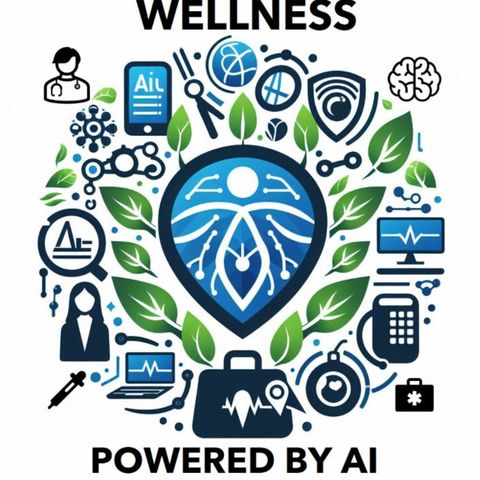Vitamin K

Dec 6, 2023 ·
3m 49s
-If you find this information useful, be sure to leave a 5 star review and subscribe so you can enjoy future episodes! -Support the show patreon.com/brainbyai -Always consult your doctor...
show more
-If you find this information useful, be sure to leave a 5 star review and subscribe so you can enjoy future episodes!
-Support the show patreon.com/brainbyai
-Always consult your doctor and do not rely solely on medical advice given by AI
Vitamin K is a fat-soluble vitamin essential for blood clotting, bone health, and various metabolic processes.
Forms:
K1 (Phylloquinone): Found in green leafy vegetables.
K2 (Menquinone): Synthesized by bacteria in the gut; also found in certain animal products.
Critical Roles in Health:
1. Blood Clotting:
Coagulation Cascade: Essential for the synthesis of clotting factors, preventing excessive bleeding.
2. Bone Metabolism:
Calcium Regulation: Involved in bone mineralization and regulation of calcium within blood vessels.
3. Cardiovascular Health:
Arterial Health: May contribute to preventing arterial calcification.
4. Cell Growth and Regulation:
Cell Proliferation: Involved in regulating cell growth and preventing abnormal cell proliferation.
Symptoms of Vitamin K Deficiency:
1. Bleeding Issues:
Easy Bruising: Subcutaneous bleeding causing bruising.
Excessive Bleeding: Prolonged bleeding after injuries or surgeries.
2. Bone Health Problems:
Osteoporosis: Decreased bone mineral density leading to increased fracture risk.
3. Cardiovascular Complications:
Arterial Calcification: Increased risk of arterial calcification and cardiovascular issues.
Testing for Low Vitamin K Levels:
1. Blood Tests:
Prothrombin Time (PT) and International Normalized Ratio (INR): Measures blood clotting time; prolonged times may indicate deficiency.
Undercarboxylated Osteocalcin: A marker of vitamin K's role in bone health.
Vitamin K Status Test:
Dependent on Biomarkers: Measurement of vitamin K-dependent proteins in the blood.
Vitamin K Supplementation:
1. Dietary Sources:
Leafy Greens: Kale, spinach, broccoli.
Vegetable Oils: Soybean oil, canola oil.
Animal Products: Liver, egg yolks.
2. Supplementation:
Considerations: Deficiency is rare in healthy individuals with a balanced diet. Supplementation is generally unnecessary unless advised by a healthcare professional.
3. Types of Supplements:
Vitamin K1 Supplements: May be recommended for specific deficiencies or conditions.
Vitamin K2 Supplements: Emerging research suggests potential benefits for bone and cardiovascular health.
4. Potential Risks:
Interaction with Medications: Vitamin K can interact with blood-thinning medications; consultation with a healthcare professional is crucial.
5. Professional Guidance:
Individualized Recommendations: Based on health status, medications, and dietary habits.
Monitoring: Regular monitoring of blood clotting factors in individuals on anticoagulant therapy.
Conclusion:
Vitamin K is vital for blood clotting, bone health, and various metabolic functions. While deficiency is uncommon in individuals with a balanced diet, professional guidance is crucial for those with specific health conditions or medication regimens. A diverse diet with leafy greens, vegetable oils, and animal products can provide sufficient vitamin K for most individuals. Supplementation, if necessary, should be undertaken under the supervision of healthcare professionals to prevent potential interactions and ensure optimal health outcomes. Regular monitoring through blood tests helps assess vitamin K status and adjust supplementation if needed.
show less
-Support the show patreon.com/brainbyai
-Always consult your doctor and do not rely solely on medical advice given by AI
Vitamin K is a fat-soluble vitamin essential for blood clotting, bone health, and various metabolic processes.
Forms:
K1 (Phylloquinone): Found in green leafy vegetables.
K2 (Menquinone): Synthesized by bacteria in the gut; also found in certain animal products.
Critical Roles in Health:
1. Blood Clotting:
Coagulation Cascade: Essential for the synthesis of clotting factors, preventing excessive bleeding.
2. Bone Metabolism:
Calcium Regulation: Involved in bone mineralization and regulation of calcium within blood vessels.
3. Cardiovascular Health:
Arterial Health: May contribute to preventing arterial calcification.
4. Cell Growth and Regulation:
Cell Proliferation: Involved in regulating cell growth and preventing abnormal cell proliferation.
Symptoms of Vitamin K Deficiency:
1. Bleeding Issues:
Easy Bruising: Subcutaneous bleeding causing bruising.
Excessive Bleeding: Prolonged bleeding after injuries or surgeries.
2. Bone Health Problems:
Osteoporosis: Decreased bone mineral density leading to increased fracture risk.
3. Cardiovascular Complications:
Arterial Calcification: Increased risk of arterial calcification and cardiovascular issues.
Testing for Low Vitamin K Levels:
1. Blood Tests:
Prothrombin Time (PT) and International Normalized Ratio (INR): Measures blood clotting time; prolonged times may indicate deficiency.
Undercarboxylated Osteocalcin: A marker of vitamin K's role in bone health.
Vitamin K Status Test:
Dependent on Biomarkers: Measurement of vitamin K-dependent proteins in the blood.
Vitamin K Supplementation:
1. Dietary Sources:
Leafy Greens: Kale, spinach, broccoli.
Vegetable Oils: Soybean oil, canola oil.
Animal Products: Liver, egg yolks.
2. Supplementation:
Considerations: Deficiency is rare in healthy individuals with a balanced diet. Supplementation is generally unnecessary unless advised by a healthcare professional.
3. Types of Supplements:
Vitamin K1 Supplements: May be recommended for specific deficiencies or conditions.
Vitamin K2 Supplements: Emerging research suggests potential benefits for bone and cardiovascular health.
4. Potential Risks:
Interaction with Medications: Vitamin K can interact with blood-thinning medications; consultation with a healthcare professional is crucial.
5. Professional Guidance:
Individualized Recommendations: Based on health status, medications, and dietary habits.
Monitoring: Regular monitoring of blood clotting factors in individuals on anticoagulant therapy.
Conclusion:
Vitamin K is vital for blood clotting, bone health, and various metabolic functions. While deficiency is uncommon in individuals with a balanced diet, professional guidance is crucial for those with specific health conditions or medication regimens. A diverse diet with leafy greens, vegetable oils, and animal products can provide sufficient vitamin K for most individuals. Supplementation, if necessary, should be undertaken under the supervision of healthcare professionals to prevent potential interactions and ensure optimal health outcomes. Regular monitoring through blood tests helps assess vitamin K status and adjust supplementation if needed.
Information
| Author | Patriot Radio Network |
| Website | - |
| Tags |
Copyright 2024 - Spreaker Inc. an iHeartMedia Company
